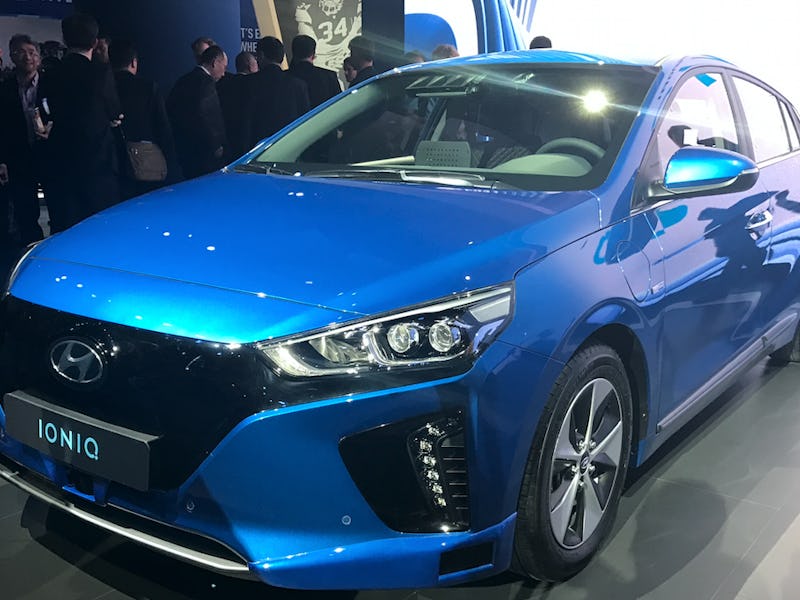We Are Entering the Era of Car Subscriptions
Treat your car like you do your phone.

Ten years from now, buying a car might be as simple as upgrading to the new iPhone.
Mike O’Brien, VP of product planning for Hyundai, pulled his phone from his suit pocket and held it in the air in front of a small audience of reporters inside the Los Angeles Convention Center this week.
“When I go to a Verizon or Sprint or T-Mobile, I scratch my name one time on that pad and I run my credit card,” he tells Inverse. “For that, I get a phone, I get a warranty if I lose the phone, I get a warranty if I drop it in the bathtub, I get all the services I pay for with the phone, and it’s just with one scratch, one credit card swipe.”
With its new Ioniq Electric car, Hyundai is also gauging interest in such a subscription service with Ioniq Unlimited, a pilot program that begins in early 2017 in southern California. It promises a down payment of $0, a fixed monthly payment, all the fees included, and free charging (with unlimited miles). Subscriptions last 24 months or 36 months and are subject to a credit check, so it’s like a lease in that sense. And in January, Hyundai has plans for a grand autonomy demonstration for the Ioniq at the Consumer Electronic Show in Las Vegas. So eventually the car you subscribe to will drive itself.
Hyundai wants to subscribe to its all-electric Ioniq.
O’Brien goes in for the close:
“Our goal is to make car ownership as easy as it is to own a mobile device. Instead of all the steps you go through to purchase — you’ve got to find financing, you to negotiate the deal, you’ve got to think about the trade-in — all those steps are very complicated, particularly when you talk to millennials. Millennials love the idea of a one-swipe transaction.”
Ah yes, millennials.
“We’re very excited about it, particularly in expanding our footprint in terms of millennial buyers who are showing the most interest in this kind of a business model,” O’Brien continued.
“Millennial” was peppered over the remarks in many press conferences and keynotes at Automobility LA, the name for the press days ahead of the LA Auto Show that opened to the public Friday. The leading edge of the generation is 35 years old, with enough purchasing power to dictate how car makers operate.
Hyundai is the first major car company to embrace the subscription model — it created its own internal company for the pilot — and the only one at the Auto Show to make the lifestyle-oriented service part of its press conference.
“We’re moving away from the notion of going down the auto dealer band buying a car,” explained Gerry Tierny, an associate principal at architecture and design firm Perkins+Will in San Francisco during a panel on car sharing earlier in the week. “We are moving away from ‘I go down to the dealer and purchase my car.’ We’re going to be going down to General Motors or Ford or Chrysler or wherever to buy a subscription from one of those firms.”
While Hyundai is targeting long-term subscriptions, there’s a slew of short-term offerings. Ride-sharing company Zipcar, a subsidiary of car renters Avis, has been around for years, but German automaker BMW expanded its ReachNow car-sharing program to Brooklyn this week after launches in Seattle and Portland. Another new start-up, Turo, promises to be a sort of Airbnb for cars.
Tierny says the subscription model — whether offered by major automakers, or even landlords — is here. He offered this picture: In San Francisco, two blocks from his office, a building-size billboard for Audi appears on the side of an apartment tower: “‘If you live in this high-rise, you get a subscription to Audi,’” it reads. “It’s happening, folks.”